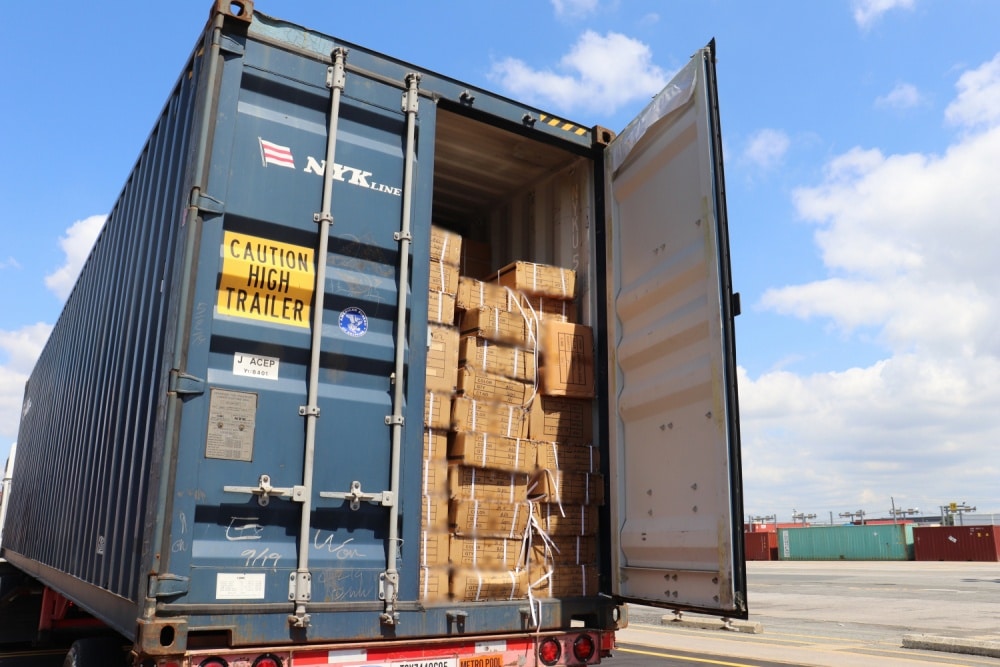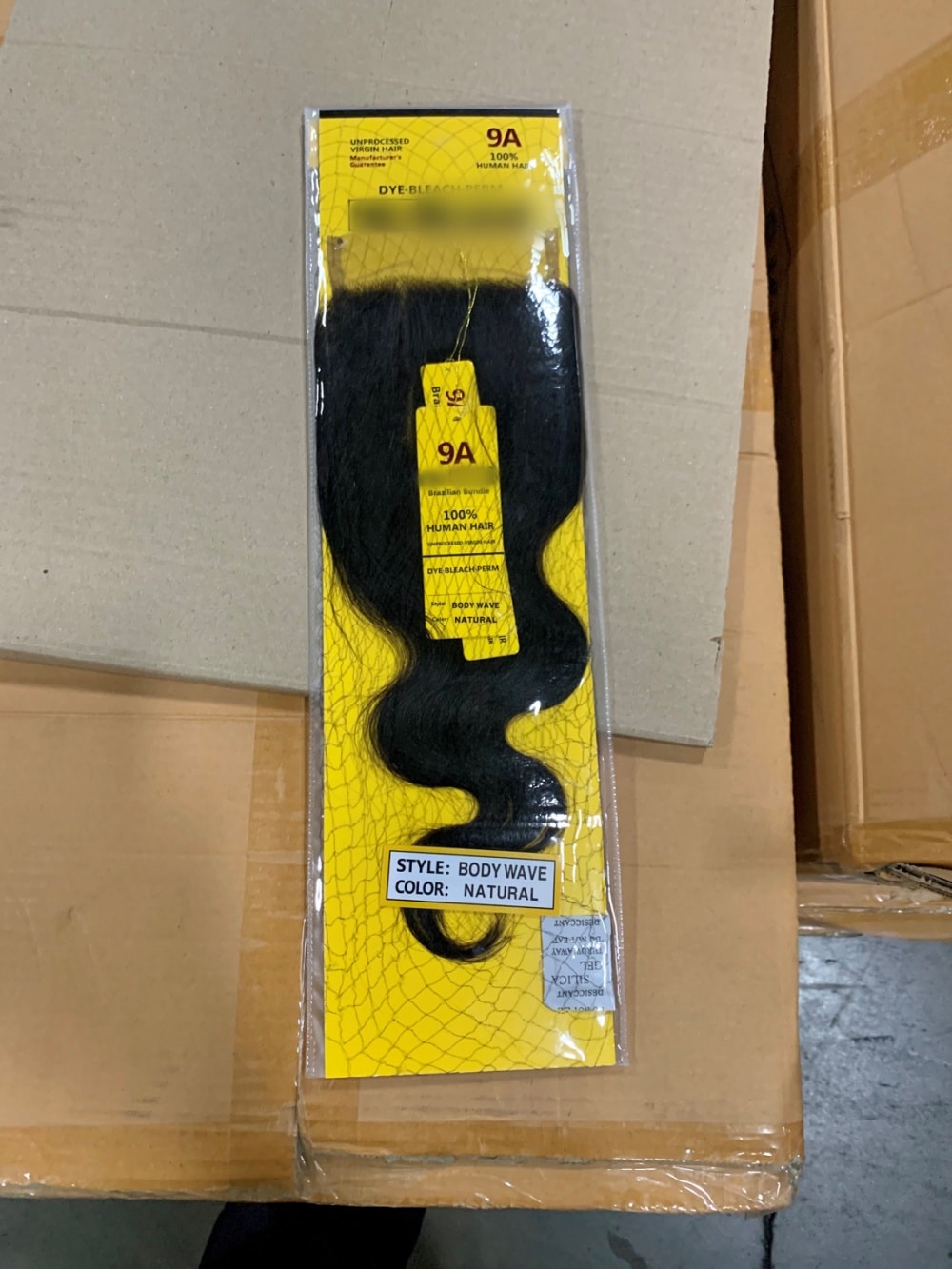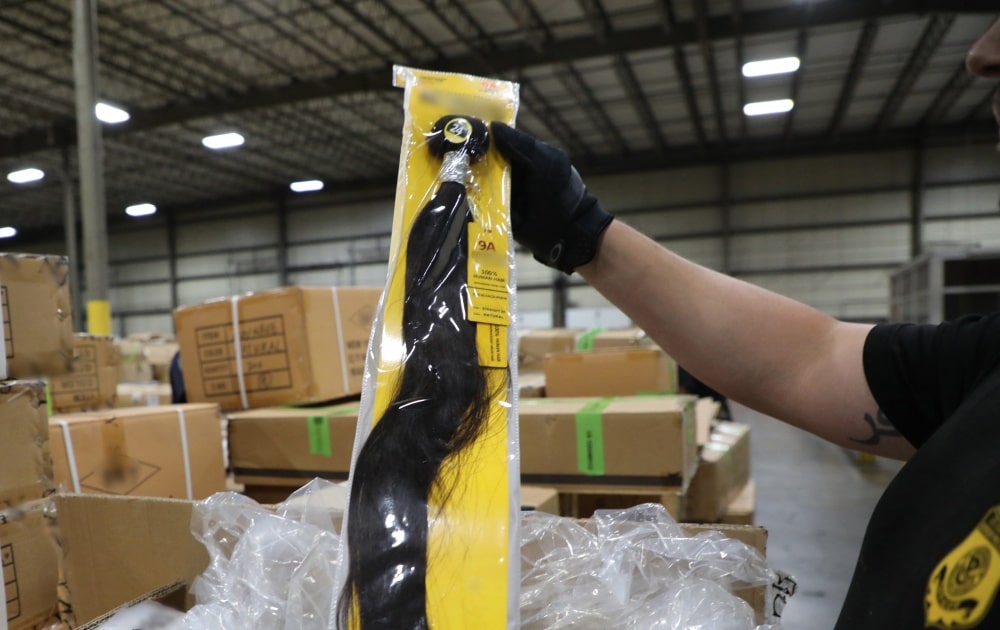This article was originally published by Radio Free Europe/Radio Liberty and is reprinted with permission.
U.S. customs officials have seized a shipment of products made from human hair believed to have been produced by Muslims held in labor camps in China’s western Xinjiang Province.
The production of the goods “constitutes a very serious human rights violation,” said Brenda Smith, executive assistant commissioner for trade at the U.S. Customs and Border Patrol (CBP).

Officers of Customs and Border Protection (CBP) Office of Field Operations (OFO) at the Port of New York/Newark inspect a shipment of hair pieces and accessories from China, part of which is suspected to have been made with forced or prison labor in violation of U.S. Law. (U.S. Customs and Border Protection/Released)
The products were part of an $800,000, 13-ton shipment from Lop County Meixin Hair Product Company, the CBP said in a statement. CBP has ordered that the company’s goods be held on grounds it uses prison and forced labor, including children.
Smith said the detention order, dated June 17, is intended to send a message to all entities seeking to do business with the United States “that illicit and inhumane practices will not be tolerated in U.S. supply chains.”

Officers of Customs and Border Protection (CBP) Office of Field Operations (OFO) at the Port of New York/Newark inspect a shipment of hair pieces and accessories from China, part of which is suspected to have been made with forced or prison labor in violation of U.S. Law. (U.S. Customs and Border Protection/Released)
Lop County Meixin was the third Xinjiang exporter of human hair to be blacklisted in recent months for using forced labor. The products are typically used in weaves and extensions.
Beijing has faced condemnation for placing more than 1 million Uyghurs and members of other mostly Muslim ethnic groups in Xinjiang in concentration camps since early 2017.

Officers of Customs and Border Protection (CBP) Office of Field Operations (OFO) at the Port of New York/Newark inspect a shipment of hair pieces and accessories from China, part of which is suspected to have been made with forced or prison labor in violation of U.S. Law. (U.S. Customs and Border Protection/Released)
China says the camps are reeducation and training centers needed to combat separatist terrorism and extremism.
Uyghurs are the largest Turkic-speaking indigenous community in Xinjiang followed by Kazakhs. The region is also home to ethnic Kyrgyz, Tajiks, and Hui, also known as Dungans.

Officers of Customs and Border Protection (CBP) Office of Field Operations (OFO) at the Port of New York/Newark inspect a shipment of hair pieces and accessories from China, part of which is suspected to have been made with forced or prison labor in violation of U.S. Law. (U.S. Customs and Border Protection/Released)
The CBP said it is the responsibility of all U.S. importers to confirm their supply chains are free of forced labor to ensure that the origin and quality of goods imported align with U.S. laws.
The announcement came as the U.S. State, Commerce, Treasury, and Homeland Security departments warned U.S. businesses to beware importing goods through supply chains that involve forced or prison labor in Xinjiang and elsewhere in China.
The departments also warned companies against supplying surveillance tools to authorities in Xinjiang or aiding in the construction of facilities used in the mass detention of Uyghurs and other minorities in the province.
The Chinese government “continues to carry out a campaign of repression in Xinjiang, targeting Uyghurs, ethnic Kazakhs, ethnic Kyrgyz, and members of other Muslim minority groups,” the State Department said.
Businesses that expose themselves to this “should be aware of the reputational, economic, and legal risks,” they said.
A report published earlier this week by China expert Adrian Zenz said China is forcing women to be sterilized or use contraceptive devices in an attempt to limit the population of Uyghurs and other mostly Muslim minority groups in Xinjiang.
The report, which said China’s policies may amount to slow-motion demographic “genocide,” led to calls for an international investigation into China, which called the allegations “baseless.”



